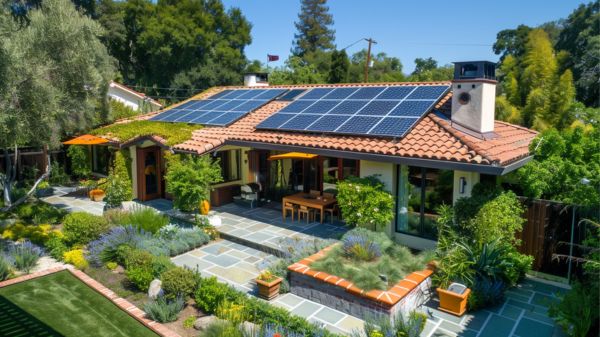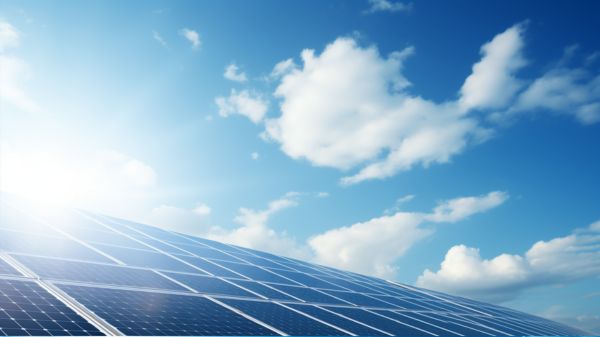Hey there! Are you curious about why implementing green energy has its upsides and downsides? Well, buckle up because we’re about to dive into the pros and cons of green energy implementation.
You see, green energy sources like solar, wind, and hydroelectric power are renewable and don’t deplete our precious natural resources. Plus, they’re super eco-friendly, emitting minimal carbon and greenhouse gases. The best part? Green energy can even improve public health by reducing emissions and pollutants, create job opportunities, and contribute to our energy independence.
But hold on, there are also some challenges to consider, like the intermittent nature of renewable energy due to weather conditions and the initial high investment cost. So, let’s explore the fascinating world of green energy together and weigh the benefits and drawbacks. Let’s go!
Advantages of Green Energy Implementation
We believe that implementing green energy has numerous advantages for a sustainable future.
One of the main advantages of green energy is that it comes from renewable sources, such as solar power. Solar panels, which convert sunlight into electricity, are becoming increasingly popular as a way to generate clean energy. Unlike fossil fuels, solar power doesn’t produce harmful emissions, making it an environmentally friendly choice.
Another advantage is that renewable energy systems are reliable and not impacted by trade laws or political instabilities. This means that countries can become more self-sufficient in their energy production, reducing their dependence on imported fuels.
Additionally, green energy can create jobs and help reduce poverty. As the demand for renewable energy grows, more employment opportunities are being created in industries such as solar panel manufacturing and installation.
Disadvantages of Green Energy Implementation
Despite its numerous advantages, green energy implementation also has some drawbacks.
One of the disadvantages of renewable energy is its intermittency. Solar energy, for example, can only be generated during daylight hours and is dependent on weather conditions. Similarly, wind turbines require consistent wind speeds to operate efficiently. This intermittency can affect the reliability and efficiency of these energy sources.
Another disadvantage is the financial aspect. The construction and installation of green energy infrastructure can be costly, and it may take time for the investments to become profitable. Additionally, some renewable energy projects, such as large-scale hydropower, can have negative impacts on local ecosystems and biodiversity.
Lastly, the storage and transmission of green energy can present logistical challenges, particularly in areas with underdeveloped infrastructure.
Despite these drawbacks, it’s important to continue exploring and implementing green energy solutions to reduce greenhouse gas emissions and combat global warming.
Environmental Benefits of Green Energy
One significant environmental benefit of green energy is the reduction of greenhouse gas emissions. Unlike fossil fuels, which release carbon dioxide and other harmful gases when burned, renewable energy sources such as solar, wind, and hydroelectric power produce electricity without emitting any greenhouse gases.
This reduction in global emissions is crucial in mitigating climate change and addressing environmental issues. By transitioning to green energy, we can significantly decrease our carbon footprint and contribute to a cleaner, healthier planet.
Additionally, renewable energy sources are sustainable and inexhaustible, unlike fossil fuels, which are finite resources that contribute to environmental degradation throughout their lifecycle. Therefore, investing in green energy not only helps combat climate change but also ensures a more sustainable future for generations to come.
Economic Implications of Green Energy
The economic implications of green energy include job creation, cost savings, and increased investment opportunities.
As the world continues to transition to renewable energy sources, the power sector is experiencing a shift away from fossil fuels, such as coal and natural gas, towards cleaner alternatives like solar and wind power. According to the International Energy Agency (IEA), renewable energy sources accounted for 26.2% of global electricity generation in 2018, and this number is expected to rise.
This transition not only has significant financial benefits, but also creates new job opportunities in the renewable energy sector. Furthermore, investing in alternative energy sources can lead to cost savings in the long run, as renewable energy technologies become more efficient and affordable.
It’s important to recognize the potential of green energy to drive economic growth and create a sustainable future.
Social Impact of Green Energy
As we delve into the social impact of green energy, it’s crucial to acknowledge the transformative potential it holds for communities worldwide. The adoption of renewable energy sources brings numerous advantages that positively affect society.
Firstly, transitioning from fossil fuels to sustainable energy helps reduce air pollution, improving public health. By replacing gas and coal power plants with clean energy alternatives, we can mitigate the negative health effects associated with pollution and climate change.
Additionally, the growth of renewable energy creates new job opportunities, supporting workers transitioning from fossil fuel industries. This not only addresses unemployment but also promotes economic stability within communities.
Moreover, renewable energy offers a decentralized approach, allowing communities to be more self-sufficient and resilient against disasters, particularly in isolated areas.
Ultimately, the social impact of green energy is significant, fostering healthier communities and providing new avenues for economic growth and independence.
Conclusion
In conclusion, the implementation of green energy offers numerous advantages, such as:
- Renewable and environmentally friendly sources
- Improved public health
- Job creation
- Energy independence
However, challenges such as:
- Intermittent nature
- High initial costs
- Space requirements
need to be addressed. Despite these drawbacks, the environmental benefits, economic implications, and social impact of green energy make it a crucial solution for a sustainable future.
Let’s embrace green energy and pave the way for a cleaner and greener world.




